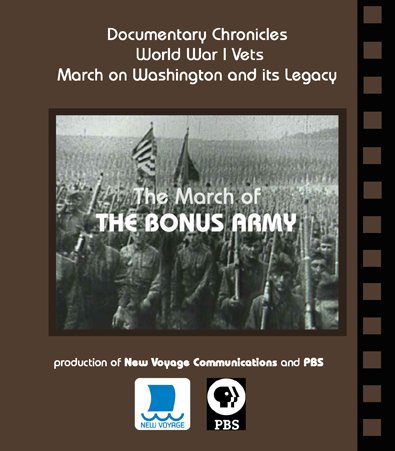

FOR IMMEDIATE RELEASE:
CONTACT: Robert Uth or Glenn Marcus, New Voyage Communications
e-mail: newvoy@verizon.net
PBS to Air on May 29, Memorial Day:
“The March of the Bonus Army”
Documentary Chronicles World War I Vets March on Washington and its Legacy
WASHINGTON (3-6-06) – A new, half-hour documentary about The March of the Bonus Army to Washington will air as a PBS Primetime Special on Memorial Day, May 29, 2006 at 10:30 PM, ET. (Check local listings for exact time in your area.)
The documentary is narrated by Gary Sinise, known for his role as Lt. Dan Taylor in the film “Forrest Gump,” and star of the CBS hit program, “CSI: New York.”
This thought-provoking documentary tells the dramatic story of a march on Washington, DC in 1932 by 45-thousand World War I veterans, many with families. They came to demand a “Bonus” promised to them for their military service. Impoverished by the Great Depression, the veterans hoped their country would help them in their time of need, just as they had helped their country. Their epic journey set into motion a string of events that influenced the rights of veterans, the rights of citizens to assemble and petition the Government, and was one of the first instances of large scale racial integration in the fight for social justice.
Produced by an Emmy Award-winning team at New Voyage Communications, the film uses rare archival photographs and newsreel footage, period music, and interviews with scholars, writers, and eye-witnesses of the Bonus March, to bring this explosive and transforming episode in American history to life.
“The story of the Bonus March resonates today,” says Robert Uth, the documentary’s director.
“Soldiers are still marching home from war, and they expect the rights their country promised them. This all began with the Bonus Army.” The documentary’s producer Glenn Marcus comments, “This was an event that changed America. It literally tested the limits of our right to protest the government’s actions.”
Much of the documentary is based on the recent book, “The Bonus Army: An American Epic,” written by Paul Dickson and Thomas B. Allen and published by Walker and Company. Both authors are co-writers of the documentary. Support for the documentary was provided by the Disabled American Veterans National Service Foundation, and the Tawani Foundation. Additional support was provided by the Humanities Council of Washington, DC.
The story begins in 1924 when Congress passed a law that gave veterans financial compensation for their service in World War I. But there was a catch. The so-called “bonus” was paid as a bond, redeemable in twenty years in 1945. Veterans called it the “Tombstone Bonus” because many of them would die before they received it.
In the spring of 1932, a group of three hundred unemployed veterans set out for Washington from Portland, Oregon, under the command of Walter A. Waters, a former Army sergeant. Waters had a powerful idea: He would organize a rag tag army of poor veterans that would blossom into a political “lobby in boots.”
The veterans climbed aboard empty boxcars and rode the trains east toward the Capital. Word of their march spread like wildfire, and soon thousand of veterans from across the country were headed towards Washington. Their ranks swelled to more than 45,000 men, women and children.
The destitue marchers created a gigantic camp made up of shanties and tents along the Anacostia River near the Capitol building. A unique society evolved, one in which white and black veterans worked together to take a stand on what was rightfully theirs. Ten-year old twins Nick and Joe Oliver boxed in the camp to make extra money for their father, a Bonus Army veteran. Now in their eighties, their memories of camp life are captured in a unique interview in the program.
Many lawmakers and officials regarded the Bonus Army as a potentially unruly mob that could incite revolution. But the veterans’ rights to assemble were courageously defended by Washington’s Police Superintendent, Pelham Glassford, himself a World War I veteran.
After two tense months, tensions boiled over. Congress refused to grant an immediate payment of the Bonus, and President Herbert Hoover ordered General Douglas MacArthur, the Army Chief of Staff, to evict the veterans from downtown Washington. At MacArthur’s side was his disapproving aide, Major Dwight D. Eisenhower. Using tear gas, tanks, and saber-wielding cavalrymen, under the command of Major George S. Patton, the Army, exceeding Hoover’s order, drove all the marchers out of Washington and burned their camps. The government’s brutal treatment of thousands of homeless men and their families shocked the public and helped scuttle Hoover’s re-election bid.
Though it lost the battle, the Bonus Army was not defeated. In 1933, more Bonus Marchers returned to Washington, expecting a warm reception from President Franklin Roosevelt. But he also opposed an immediate payment of the bonus. As part of a New Deal program to employ veterans, many marchers were sent to work on construction projects in the Florida Keys. On Labor Day 1935, a powerful hurricane slammed into camps where the Bonus Army veterans lived and killed several hundred of them. Their bodies were cremated in huge funeral pyres or buried in mass graves. Early the next year in 1936, Congress overrode the president’s third veto and granted World War I veterans their Bonus. Nearly four million men and women benefited, each receiving on average $800. The money enabled many of them to buy a house, start a business or send their children to college. A new era had dawned for America’s veterans.
The United States’ entry into World War II created another generation of veterans. Concerned about a larger Bonus Army in the future, the government recognized that a new strategy was needed for helping veterans after the war. Roosevelt promised the American people that veterans would not be reduced to selling apples on street corners again. In 1944, Congress passed the “GI Bill of Rights,” which provided veterans with housing, education, and medical assistance. Countless veterans and their families have benefited from that law over the past 50 years.

THE MARCH OF THE BONUS ARMY
30-minute PBS documentary
Premieres May 29, 10:30 PM, ET (Check local listings for exact time in your area.)
A Production of New Voyage Communications
Directed by: Robert Uth
Executive producers: Robert Uth and Simonida Perica Uth
Producer: Glenn Marcus
Written by: Paul Dickson, Thomas B. Allen and Robert Uth
Art directions: Simonida Perica Uth